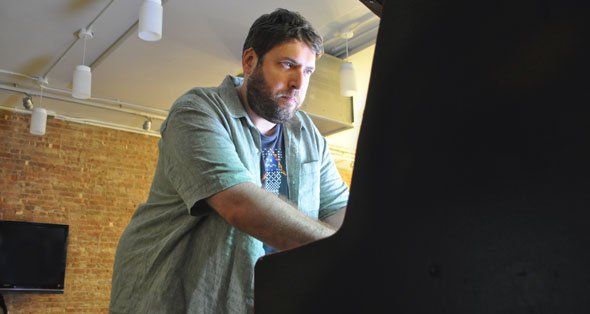gaming
Next Level
A new review raises brows high
toward video games
by Eileen Reynolds / GSAS ’11
Liel Leibovitz has been hooked on video games since he first played Atari at the age of 7—but now, as a scholar of the medium, he can honestly tell his wife that all that time spent on the couch with a game console in his hands counts as research. A visiting assistant professor of media, culture, and communication at the Steinhardt School of Culture, Education, and Human Development, Leibovitz recently founded The New York Review of Video Games, an online magazine dedicated to taking electronic play seriously. The magazine, which launches this fall, will tackle issues ranging from video game economics to representations of death and violence on-screen. NYU Alumni Magazine recently sat down with him to discuss the aims of the new periodical, the Ulysses of video games, and his theory about why gamers might make the best clergymen.
Who is the target audience for The New York Review
of Video Games? Gamers? Scholars? Both?
Nerds write about video games in a way that’s inscrutable even to me, and I have a PhD in this and have played for two hours a day for the past 28 years. They have these metrics that say things like, “re-playability is 9.4 out of 10.” This is like reviewing your first kiss and saying the tongue-to-tongue ratio was 7.6. You’re missing the point! Our goal is to provide a wide, curious, intelligent but uninformed readership with a venue for quality, long-form journalism and essays about specific titles, socioeconomic
correlations, and all the aspects of video games that scholars think about. The second goal is
to provide a completely different paradigm for video game reviews. We want to be the Lester
Bangs of video game reviewing, the Greil Marcus of video games—to produce something that has
heart and has a brain.
You’ve called video games a theological medium. What do you mean?
Video games enact, in a perfect way, the key drama of life: We’re here in this world, we don’t know the rules, and as for the designer? We’ll probably never meet him. We don’t understand it at all. We’ve got to figure it out in some way, and even if it’s preordained, there’s got to be some freedom for us. What does the designer really want from us? These are religious questions. At NYU’s Re:Play conference on the theory, business, and practice of video games in April,
I moderated a panel with a Conservative rabbi and a Baptist minister—both really big gamers. They sat onstage and said, “Being gamers has made us far better clergymen, and being clergyman has made us far better gamers.”
What game would you recommend for someone who doesn’t like running around shooting people?
Portal 2. It’s a physics-based puzzle game in which players must figure out how to walk through walls, glide through ceilings, avoid vindictive robots, and escape a deadly maze run by a deranged computer. If video games were literature, this is Ulysses. Like Joyce’s novel, this game speaks in a language that is radically new, and is as concerned with the limitations of the medium as it is with great questions of morality, civility, and fate. It’s among very few games that could easily be called a masterpiece.







